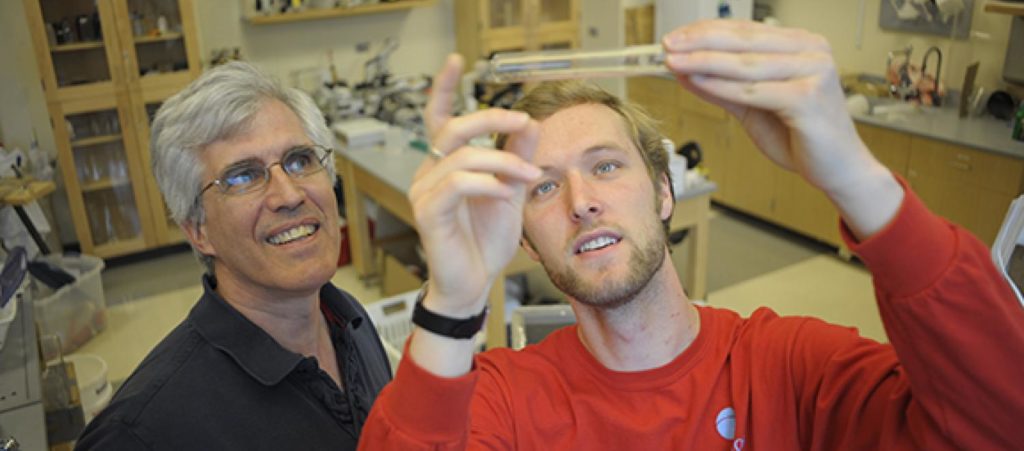
A whole lot of people would cheer any efforts to control the pesky mosquitoes that can turn any picnic into a swat fest. But for some countries, mosquito control is a matter of life and death.
Biology professor Todd Livdahl has found that very scenario in Bermuda. While accompanying Clark biology students at the Bermuda Institute of Ocean Sciences (BIOS), Livdahl’s attention was piqued by the country’s efforts to control specific mosquito species and the diseases they spread.
“I got wind of the introduction of a species to Bermuda,” says Livdahl, who saw both a great research opportunity and a way to improve the public health on the island.
Livdahl now travels to Bermuda every other year with a team of students from his vector ecology class to closely investigate several mosquito species and to observe the country’s efforts to control them.
Students stay in the BIOS housing and use the labs, but work closely with the Ministry of Health and with Vector Control in Bermuda to gauge how mosquito species change the ecology. Of particular interest is an Asian species that was introduced to North America in 1985 and Bermuda in 2000.
“We are tracking the course of the invasion of the Asian species,” says Livdahl.
He says the Asian mosquito and another species from Africa had for years continually swapped places as the more dominant species in Bermuda. Right now, the African species has disappeared from the island, but not the Caribbean region, so there’s always a possibility of reintroduction. Each carries its own potential threats to the island.
“The Asian species took over and within a few years, the African species was extinct,” says Livdahl. “We are trying to understand how this rapid displacement occurred.”
Using everything from mathematical models to experiments with larvae, Livdahl and his team hope to discover whether egg-laying patterns, breeding, feeding habits, or a combination of these and/or other factors contribute to the changes in mosquito populations.
John Soghigian ’09, a Ph.D. candidate, says his vector control research in Bermuda was a chance to see the real-life implications of research findings.
“[Livdahl’s] course was a great opportunity to get involved in research and get a hands-on feeling for public health issues,” he says. “It’s a bigger deal there — they are very concerned about the diseases from mosquitoes.”
The serious public health implications give Bermudians more incentive to make sure mosquito control is done right, Soghigian adds. Clark students learn how Bermuda’s government keeps close watch on mosquito breeding areas, even fining some homeowners who don’t comply with repeated requests to fix potential breeding-ground problems.
As an island nation, Bermuda has a lot at stake. While the Asian mosquitoes carry diseases like dengue virus, scientists are also closely watching the spread of the painful chikungunya virus, which can nearly cripple humans with joint pain, and West Nile virus, which could impact the island’s rare bird populations, says Livdahl. Livdahl’s students conduct field surveys and research.
“They learn something about the ecology of the species we are working on, and the various factors that influence where mosquitoes choose to lay eggs,” he says.
Students accompany the vector control officials as they make inspection rounds, says Livdahl, which is like peeking behind the curtain of island life. “Students get a big kick out of it,” he notes.
Ashleigh Stanton ’14 says that seeing the impact the tiny bug can have on a population has caused her to reconsider her career path. “I was more of a molecular biology student,” she says. “Ecology was out of my norm. Now I am thinking I might want to do more ecology work. For me, that’s huge.” Because the week in Bermuda is a relatively short time span, students aren’t tasked with fixing any problems, but they come to understand the implications of their findings. “We don’t get involved in eradication,” says Livdahl. “We focus more on understanding the interactions.”
